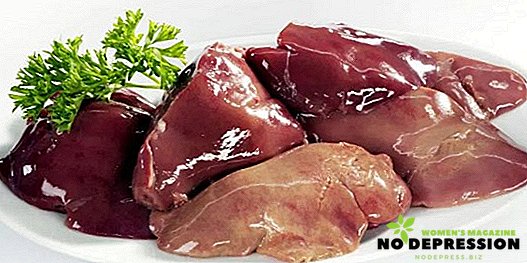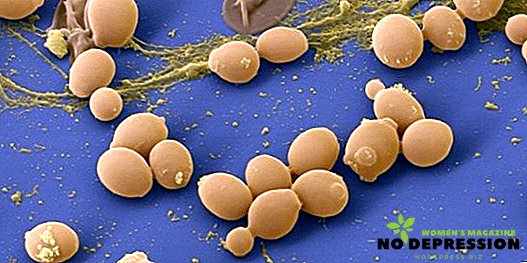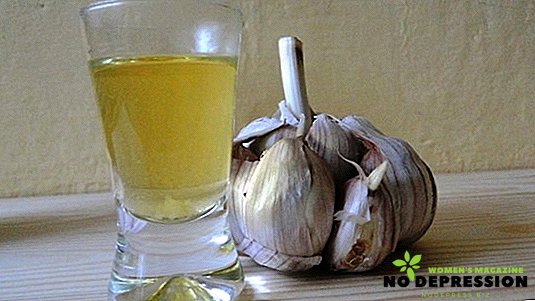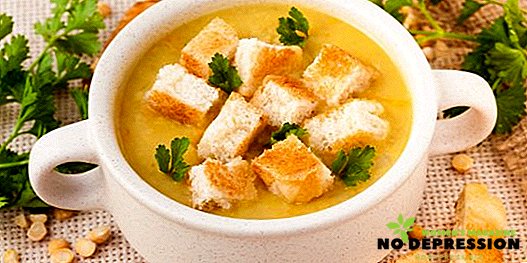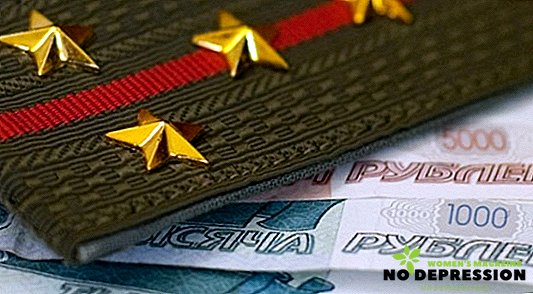Every woman knows about the most "scary" monthly days in her life - critical. Severe pain in the lower abdomen, bad mood is fraught with nervous breakdowns, nothing works at work or school, I do not want anything, and it seems that everything in life is sad.
Each lady experiences similar manifestations. However, there are so much pain that it is simply impossible to endure. You should know that this is the first signal of a serious problem in the body. Therefore, to delay and shift the appointment to the doctor is not worth it.
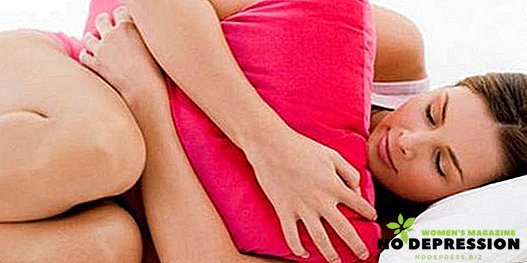
Why does my stomach hurt very much during menstruation?
Doctors relate menstruation to a mechanical process. Indeed, during this period the woman's body frees itself from unnecessary waste products.
During menstruation, the muscles of the uterus are rapidly reduced to remove from the body all the elements that "have served their own." In many women, the abdominal cavity is very sensitive, so the receptors perceive this process very sharply.
 And for others, perhaps, the uterus is rejected, while pressing on the nerve center. Therefore, there is a feeling of heaviness in the lower abdomen, pain in the lower back.
And for others, perhaps, the uterus is rejected, while pressing on the nerve center. Therefore, there is a feeling of heaviness in the lower abdomen, pain in the lower back.
Minor pain during menstruation is considered normal. However, if the pain is strong, the general feeling of indisposition lasts a long time, then this is the first alarm for you.
Gynecologists call acute pain during menstruation "dysmenorrhea." Acute pain indicates a serious malfunction in the body of a woman and certain gynecological diseases.
The most common causes of abdominal pain:
- Normal uterine contraction is the most common cause during critical days. The body produces special hormones called prostaglandins. They cause drastic cuts in the uterus and blood secretion. The level of intensity of contractions directly depends on the amount of prostaglandins and naturally affects the strength of the pain.
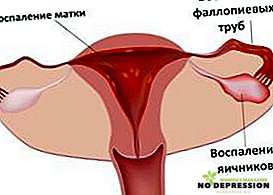 Gynecological diseases. Pathologies or diseases of a reproductive nature often become causes of acute and severe pain. Endometriosis, fibrosis, adnexitis and other inflammatory diseases can occur in a woman’s body.
Gynecological diseases. Pathologies or diseases of a reproductive nature often become causes of acute and severe pain. Endometriosis, fibrosis, adnexitis and other inflammatory diseases can occur in a woman’s body.- The lack of trace elements in the body. The usual lack of magnesium and potassium in a woman’s body can negatively affect the reproductive system and affect the intensity of the pain syndrome.
- Hereditary factor. If critical female days were painfully close to female relatives, then it is likely that this “gift” is also waiting for you. The reason for this - the genetic feature of the body and its sensitivity to pain.
- Negative grounds. The following factors can provoke severe pain in the lower stomachs during critical days:
- hypodynamia (a disease that is accompanied by stagnation in the pelvic organs and circulatory disorders in the genitals);
- increased stresses and severe overwork (the body weakens and gets tired during stressful situations, therefore sensitivity to pain increases);
- no balance in the diet.
Causes of severe chest pain before menstruation
In addition to acute pain in the abdomen, many women feel discomfort in the chest. The nature of chest pain can be different: both permanent and intermittent. Pain may occur in such cases:
- Normal "response" of the body during normal menstruation. Doctors call this pain "mastodinia". This is a normal phenomenon, due to a slight increase in the glandular tissue of the mammary glands. Contributes to this process the release of a ripe egg from the follicle (12-14 days of menstruation), the hormones of estrogen begin to be produced sharply, affecting the mammary glands.
- Rebuilding the body at the hormonal level is associated with the process of preparing for a possible pregnancy. The breast may increase or swell, as breast tissue expands rapidly. If there is no pregnancy, then a breast reduction occurs after the completion of critical days.
Severe pain during menstruation: what to do?
Our grandmothers argued that the pain must be endured. However, today it is possible to reduce the severe pain in quite simple ways:
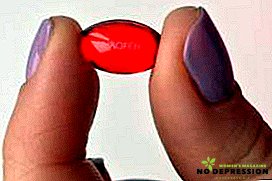 Taking painkillers. If the pain is not acute, no better tolerate it. The most effective drugs: "Analgin", "No-shpa", "Ketanov", "Ibuprofen". However, if you experience severe pain on a monthly basis, you should contact your gynecologist so that he will prescribe a drug that will suit you.
Taking painkillers. If the pain is not acute, no better tolerate it. The most effective drugs: "Analgin", "No-shpa", "Ketanov", "Ibuprofen". However, if you experience severe pain on a monthly basis, you should contact your gynecologist so that he will prescribe a drug that will suit you.- Soothing medication. If you are very nervous during menstruation, then take a sedative. So, the usual valerian can help you.
- A hot-water bottle or a regular bottle of warm water helps to increase blood circulation, and as a result, a decrease in spasms. A heater or bottle must be kept no more than 15 minutes. Try to lie still and not overload yourself throughout the day.
- Exercises for the respiratory system. Doctors say breathing exercises help relieve spasmodic pain. You should take any non-heavy object (small book) and put it on your stomach. Breathe in calmly and breathe gently through your nose. With each inhale, raise the belly with the book. After that, you need to stop and strain it for 5 seconds. Perform the exercise is not more than two minutes.
 Herbal infusions. During critical days, doctors recommend drinking plenty of water. Ordinary tea, prefer herbal infusion or tea with such herbs: chamomile, raspberry, oregano.
Herbal infusions. During critical days, doctors recommend drinking plenty of water. Ordinary tea, prefer herbal infusion or tea with such herbs: chamomile, raspberry, oregano.- An effective way to get rid of pain is a simple massage. Clockwise massage the abdomen. Also with the help of two shady balls you can massage the spine. To do this, you need to put two balls in a sock and lie on them. It is necessary to roll balls on a vertebra about two-three minutes.
- Proper nutrition. Limit your sweetness, spicy and fatty foods. You should eat vegetables, fruits, and foods that contain iron: buckwheat, liver.
Traditional medicine
Treatment of severe pain during menstruation at home can be carried out using the following folk remedies:
- Mint leaves, chamomile and valerian root mix proportion of 2: 2: 1. So that came out 1 tbsp. l mixes. Then pour 1 tbsp. boiling water and let it brew for 30 minutes. Then strain and take three times a day, 2 tbsp. l
- If you feel severe pain, then tansy will help. So, you need 1 tbsp. l flowers on 1 tbsp. boiling water. It should be infused for an hour, then strain. Daily 4-5 times take 1 spoon.

- In case of severe bleeding, the following decoction should be taken a few days before the beginning of the menstrual period, as well as over the next four days. You need:
- crushed grass of horsetail - 1 tbsp. l
- crushed herb Hypericum - 1 tbsp. l
- motherwort tincture (Valerian)
- crushed oak bark - 1 tbsp. l
- 0.8 liters of boiling water.
Mix the herbs and place in a glass dish, then pour boiling water over it. Wrap a towel and let cool. It should be taken three times a day instead of tea, adding a few drops of motherwort or 4 drops of valerian.
When do I need to contact a gynecologist?
There is such a strong pain during the menstrual cycle that it is absolutely necessary to go to the doctor. Emergency cases are manifested by the following symptoms:
- severe pain in the genital area;
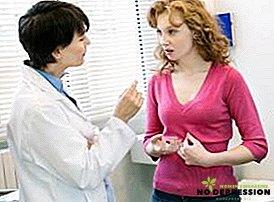
- heat;
- copious discharge;
- long duration of menstruation days;
- unnatural color of discharge, accompanied by a nasty smell;
- sharp, prolonged chest pains;
- itching and burning in the genital tract.
The above symptoms are evidence that an inflammatory process occurs in the body. If you go to a doctor in time, he will be able to give you an appropriate diagnosis and prescribe the necessary treatment that will help you alleviate your condition and prevent complications.
Also, do not postpone the trip to the gynecologist and newly born women. If, after eight weeks, menstruation does not become normal, immediately contact a specialist.
Doctors say that you should go to the reception after the end of menstruation for 1-4 days. It is these days that the analyzes are more informative.
Prevention
Of course, it is impossible to completely prevent pain during the menstrual cycle, but with the help of preventive methods it can be reduced. If you have no pathologies, the prevention of pain can be carried out calmly. So you should follow these recommendations:
- before the expected deadline of critical days, limit yourself to taking dairy and meat products, they can cause flatulence and bloating;
- drink freshly squeezed vegetable juices (carrot, beetroot);

- take vitamins E and B, as well as calcium and magnesium;
- before menstruation should reduce physical activity;
- use less strong coffee or tea;
- try not to be nervous and to avoid stressful situations in your life as much as possible;
- Visit the gynecologist regularly (once every six months).
Be healthy!
And in addition to the article - a useful video on the topic.


 Gynecological diseases. Pathologies or diseases of a reproductive nature often become causes of acute and severe pain. Endometriosis, fibrosis, adnexitis and other inflammatory diseases can occur in a woman’s body.
Gynecological diseases. Pathologies or diseases of a reproductive nature often become causes of acute and severe pain. Endometriosis, fibrosis, adnexitis and other inflammatory diseases can occur in a woman’s body. Taking painkillers. If the pain is not acute, no better tolerate it. The most effective drugs: "Analgin", "No-shpa", "Ketanov", "Ibuprofen". However, if you experience severe pain on a monthly basis, you should contact your gynecologist so that he will prescribe a drug that will suit you.
Taking painkillers. If the pain is not acute, no better tolerate it. The most effective drugs: "Analgin", "No-shpa", "Ketanov", "Ibuprofen". However, if you experience severe pain on a monthly basis, you should contact your gynecologist so that he will prescribe a drug that will suit you. Herbal infusions. During critical days, doctors recommend drinking plenty of water. Ordinary tea, prefer herbal infusion or tea with such herbs: chamomile, raspberry, oregano.
Herbal infusions. During critical days, doctors recommend drinking plenty of water. Ordinary tea, prefer herbal infusion or tea with such herbs: chamomile, raspberry, oregano.



